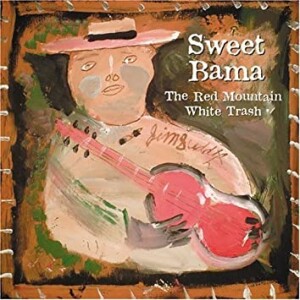 Red Mountain White Trash plays old-time Southern string-band music as what it is: energetic dance music. From their name, you might think them some kind of a joke band, or perhaps a bunch of kids making fun of Southern music. What they are is a bunch (eight at last count) of aging Boomers who are more in tune with the roots of the Old South than with its current trend toward gentrification as epitomized by Dallas, Atlanta and Nashville.
Red Mountain White Trash plays old-time Southern string-band music as what it is: energetic dance music. From their name, you might think them some kind of a joke band, or perhaps a bunch of kids making fun of Southern music. What they are is a bunch (eight at last count) of aging Boomers who are more in tune with the roots of the Old South than with its current trend toward gentrification as epitomized by Dallas, Atlanta and Nashville.
On Sweet Bama, their third album, the Trash again gather a passel of old-time jigs, reels, blues, waltzes and ballads, much like their previous outing, Chickens Don’t Roost Too High. It’s quite well produced for an independent recording. With two fiddles, guitar, mandolin, banjo uke, autoharp, harmonica and bass on most tracks, it doesn’t sound cluttered or muddy. Jim Cauthen and Ed Baggott provide the twin fiddle attack, with Joyce Cauthen on guitar setting a solid rhythmic and chordal structure behind them, and color and rhythm added by all the other instruments.
It’s a fine lot of tunes and songs they’ve chosen. Most are relatively obscure titles that the Trash have discovered on old records or learned from old musicians, including several from Charlie Stripling, who recorded in the 1930s. These include the lively opening track, “Coal Valley,” and “Lost Child,” which features some of the hottest fiddling on the album, a mix of bowing and picking that reveals Cauthen as a fiddler to contend with.
Others are more well known, such as “Walk Right in Belmont,” an interesting variation on “The Midnight Special” set in a factory instead of a prison, the Carter Family’s “You’ve Got to Righten That Wrong,” Uncle Dave Macon’s “Mourning Blues,” and Dock Boggs’ version of “Oh Death.” This one is sung as a trio, with vocals shared by Joyce Cauthen, Philip Foster and Jamie Finley, which highlights its nature as a dialogue between Death and a person who isn’t ready for that inevitable call.
The members of Red Mountain White Trash love this music, and they communicate that love by the way they play it, as part of a living tradition, not as museum pieces.
(Whoop It Up, 2002)
